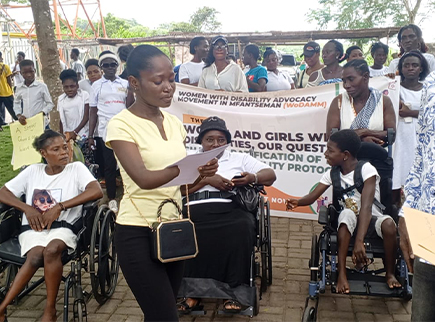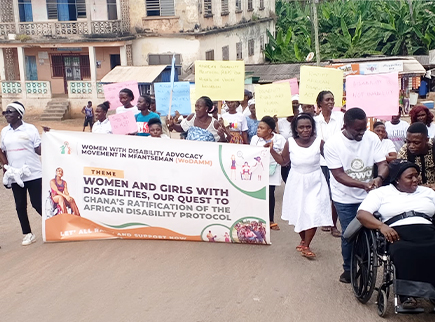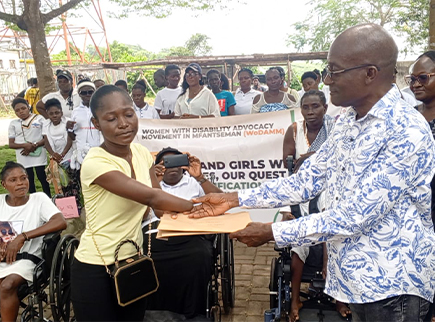Women with Disabilities Advocacy Movement in Mfantseman (WoDAMM) in the Central Region, has organised a march through the principal streets of Saltpond, demanding that government fast-tracked processes to ratify the African Disability Protocol (ADP).
The ratification of ADP is significant as it establishes a continental legal framework, specifically tailored to address the unique challenges faced by people with disabilities in Africa.
The ADP builds upon the UN Convention on the Rights of Persons with Disabilities (CRPD), but contextualises its protections to the African socio-cultural, traditional and systemic realities.
It mandates comprehensive laws to protect the rights of thousands of Africans with disabilities, combats harmful cultural practices and superstitions and requires governments to promote inclusivity in education, employment and other sectors.
The Group held placards with inscriptions like “Ratify Africa Disability Act Now”, African Disability Protocol (ADP) our Rights or Voices Inclusion”, Disability is not Inability”, A Ghana for all is Ghana that Ratify the ADP”, and “Say Yes to ADP and Let’s end Stigma”, among others.

The March was on theme: “Women and Girls with Disabilities, Our Quest to Ghana’s Ratification of the African Disability Protocol.”
Presenting the petition, Ms Felicity Yankson, President of the Group, said: “We respectfully urge government to take immediate action to ratify and domesticate the ADP, ensuring that Ghana takes the lead in promoting and protecting the rights of persons with disabilities.
“We believe that the ratification and domestication of the ADP will be a significant step towards creating a more inclusive and equitable society for all Ghanaians.”
She said that would also enable Ghanaians and other Africans countries to hold their governments accountable for equality and non-discrimination, strengthen advocacy efforts and provide mechanisms for protecting disability rights regionally and internationally.
Beyond that, it would enhance national legal alignment with disability rights, improve access to services and empower persons with disabilities to participate fully in society.
“The ADP ratification is a historic step towards fostering inclusive development, safeguarding dignity and ensuring no one is left behind in Africa’s development agenda,” she said.
“It tackles the ingrained issues of disability discrimination so that everyone can access health, education and employment without stigma,” she added.
Ms Yankson urged the public to stop discriminating against Persons with Disabilities and urged stakeholders to continue to improve and enforce the Persons with Disability Act (Act 715), aligning it with the UN Convention on the Rights of Persons with Disabilities.
That, she said, involved increasing accessibility infrastructure and services, promoting employment and education, strengthening social protection and challenging the social stigma and negative attitudes through public education and ensure the meaningful participation of PWDs in policy making.

Mrs Juliana Afia Mahmood, Executive Director of WODAMM, in an interview with the Ghana News Agency, said although the country had pledged its commitment at the Global Disability Summit, there was the need to keep the momentum going.
She said that the protocol was not intended to undermine the spirit of the UN Convention on the Rights of Persons with Disabilities (CRPD) to which most African states were already members.
Rather, she said, the protocol reaffirmed the norms established in the CRPD while addressing issues which were not dealt with by the global disability rights instrument.
Mr Justice Amoah, the Municipal Coordinating Director, received the petition on behalf of Mr Eric Stanley Acquah, the Municipal Chief Executive, and pledged to forward it to President John Dramani Mahama for redress.
“We hope when it reaches Accra, all stakeholders will play their roles, so that persons with disabilities will gain the freedom and dignity that they deserve,’ he noted.


https://shorturl.fm/4FU5I